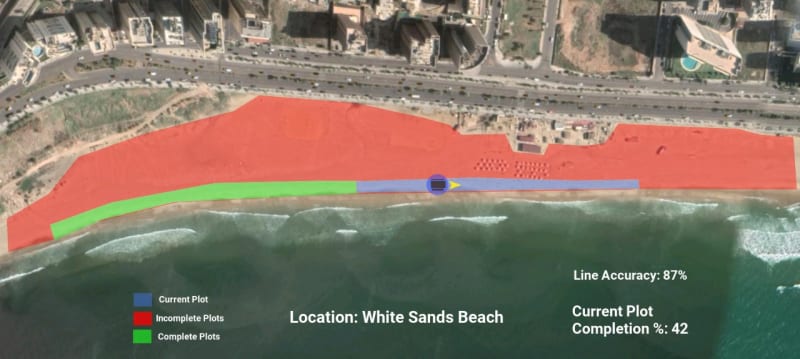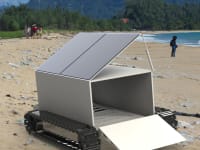The world has a plastic problem. Humans are responsible for 32 million tons of plastic litter per year that is disposed of incorrectly and ends up directly on the ground and in waterways. That’s the weight of the entire population of Botswana, as plastic trash, tossed on the ground yearly.
90% of that littering occurs in developing countries, where bad infrastructure and lack of municipal services make it difficult for ordinary people to recycle.
We believe that people in more privileged countries would be shocked and would be motivated to do something about the problem of plastic litter, if they were faced firsthand with the problem themselves. So we set out to bring awareness of the problem to the whole world, and give people everywhere a way to help.
Our product, the good robot hyena, is a plastic collecting robot which can be driven remotely from anywhere in the world. It’s equipped with a conveyor belt collect and sort mechanism, tank tracks, and front and back cameras mounted on gimbals.
Users can control the robot and donate two minutes of their time towards identifying and collecting plastic waste, and compete against their friends for time donated and amount of plastic collected. We will maintain the hyena robots on polluted beaches and roads in developing countries, and users can proudly say they are doing something to directly fight against plastic waste.
In addition to removing the plastic, we have a new life planned for the recovered plastic. Using plastic road technology, we will work to build new roads to improve the infrastructure in areas plagued by plastic litter, to make it easier for people to recycle. We will also use recovered plastic to 3d print parts of new robots and to repair old ones.
The value of recovered plastic ranges from €110-330/ton. If we take Nigeria as an example, where 600,000 tons of plastic are littered each year, the value of that plastic is between €660M and €1.98B. The country’s total budget is about €25B, so the addition of the value of recovered plastic towards municipal recycling improvements would mean up to a 7% increase in available spending.
We're motivated and inspired by the success of projects like the Urban Rivers Trashbot and the Ocean Cleanup project. The Trashbot project demonstrated that it is feasible to open up a remote controlled trash collecting robot to people across the world, and the Ocean Cleanup project showed that it is commercially viable to collect and reuse recovered plastic. Our hope is that with the willpower and altruism of people across the globe, we can rid developing countries of much of the plastic waste ruining the environment, and that we can turn that plastic waste into solutions which help to make recycling easier.
"Plastic Pollution - Our World in Data." https://ourworldindata.org/plastic-pollution
"PlasticRoad - A revolution in building roads." https://www.plasticroad.eu/en/
"Realising the value of recovered plastics." http://www.wrap.org.uk/content/plastics-market-situation-report-2010-update.
"A window into Nigeria's recycling industry". https://cycled.no/a-window-into-nigerias-recycling-industry/.
Video
Like this entry?
-
About the Entrant
- Name:Ben Olayinka
- Type of entry:teamTeam members:Ben Olayinka
Zouheir Alameddine - Software used for this entry:Solidworks
- Patent status:none








